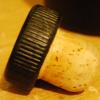-
Welcome to the eG Forums, a service of the eGullet Society for Culinary Arts & Letters. The Society is a 501(c)3 not-for-profit organization dedicated to the advancement of the culinary arts. These advertising-free forums are provided free of charge through donations from Society members. Anyone may read the forums, but to post you must create a free account.
Honest food. Honestly.
-
Similar Content
-
- 1,051 replies
- 192,982 views
-
- 2,694 replies
- 552,713 views
-
Food Tones
By liuzhou,
- 16 replies
- 1,188 views
-
- 145 replies
- 29,878 views
-
Food Songs 1 2 3
By liuzhou,
- 68 replies
- 14,163 views
-
-
Recently Browsing 0 members
- No registered users viewing this page.






Recommended Posts